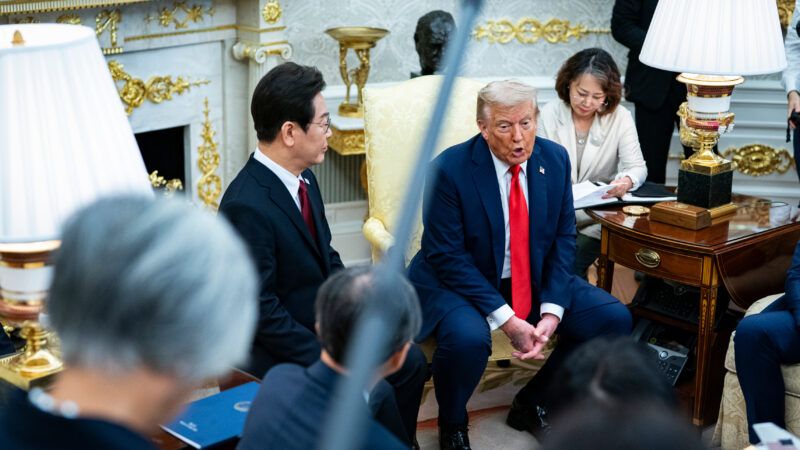Does It Matter That Donald Trump Is Confused by Magnets?
Is this another example of Trump's inability to understand why global trade is good for America, or does it suggest something even more serious?

In just a few months since returning to the White House, President Donald Trump has claimed remarkable powers to reshape global trade and has erected some huge barriers to imports into the United States.
Trump has done all of that while repeatedly revealing how little he knows about what he imagines he can design. By now, it is obvious that Trump does not understand what trade deficits are, does not know that Americans bear the cost of his tariffs, and does not comprehend how American manufacturing is dependent on global supply chains.
But what if the problem actually runs deeper than that? What if the man who has been entrusted by the Republican Party to reshape huge swaths of the national economy and the flow of global trade is suffering from the same sort of cognitive decline that marked Joe Biden's time in office?
It's an unsettling question, but one that ought to be pondered in the wake of what happened on Monday in the Oval Office. While hosting South Korean President Lee Jae Myung and taking questions from reporters, Trump went off on a long, nonsensical tangent about magnets and what he apparently believes is a two-decade-long conspiracy orchestrated by the Chinese government.
"They have to give us magnets," Trump began. "If they don't give us magnets, then we have to charge them 200 percent tariff for something, you know?"
Alas, there's the old fallacy at the root of so much of Trump's trade policies. In effect, the president is promising to place higher taxes on Americans if the Chinese government doesn't do what he wants. How that's supposed to work remains unclear as ever.
Aside from that nonsense, however, there is a discernible point here: The trade of rare earth metals, including some that are used to make high-end magnets, is a crucial part of the U.S.-China trade war. In April, China added those items to its export restriction list in response to Trump's threat of higher tariffs on Chinese goods. The inability to import those magnets is a serious problem for American automakers and other industries. It's almost like trade wars have unintended consequences.
After that, things got truly unhinged.
"You know, China intelligently went and they sort of took a monopoly of the world's magnets, and nobody needed magnets until they convinced everybody 20 years ago, 'Let's all do magnets,'" Trump continued.
To be clear, the concept of magnetism is not something that the Chinese invented in the early 2000s. It's also not true that "nobody needed magnets" before then, even though global demand for rare earth metals has increased in the digital age, since they are essential for manufacturing the advanced electronics that power everything from televisions to fighter jets
This ought to illustrate to Trump why launching a trade war with China (and much of the rest of the world) is such a terrible idea. From cocoa beans to bananas to rare earth metals like samarium and yttrium, there are tons of commodities that do not exist in sufficient quantity in the United States to meet consumers' and business' needs. The free market has found ways to solve that imbalance, but Trump's trade policies are making those solutions more expensive and difficult.
But not to worry, Trump explained, because America is now "heavy into the world of magnets now—only from a national security standpoint."
"But we have a much more powerful thing, and that's tariffs," he added. "We're going to have a lot of magnets in a pretty short period of time."
Well, that's a relief, I guess? It sounds like he's got it all under control, though anyone listening to those remarks would understandably wonder what "it" is.
Incredibly, this isn't even the craziest thing Trump has ever said on the subject of magnets.
At a campaign rally last year, Trump claimed that "all I know about magnets is this: Give me a glass of water, let me drop it on the magnets, that's the end of the magnets."
Magnets, to be clear, work just fine when they are wet. They also work underwater. (In fairness, Trump is not the first prominent figure in American culture to wonder about these things.)
Of course, Trump has never been someone who speaks with particular clarity. His unscripted remarks are often meandering, unfocused, and riddled with inaccuracies and strange non sequiturs. He believes himself to be an expert in everything from global macroeconomics to the hydraulic systems on naval ships.
Even by those standards, however, Monday's business with the magnets stands out.
Indeed, if you walked past someone in the street who was repeating Trump's words verbatim, you'd likely keep a healthy distance and possibly wonder what substance they'd most recently been using. If an elderly loved one—a parent or a grandparent, maybe—said the same things privately that Trump said in front of television cameras on Monday, you'd probably wonder if something was wrong. Maybe you'd encourage them to see a doctor.
But this isn't a bum in the park or your grandfather that we're talking about. This is the person who currently wields more power than any other human being on the planet, and who is using that power in novel and expansive ways to reshape the economy. Whatever the appropriate response might be in those other situations, shouldn't it be significantly elevated here?
I am not saying that Trump is a moron, or senile, or in a state of mental decline. But we ought to ponder with some seriousness the same question that Reason's Jacob Sullum asked a few months ago during a similarly bizarre incident: If Trump were any of those things, how would we know?


Show Comments (106)